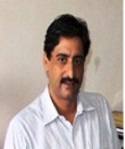
Prof. Manu Pratap Singh
Dr. B. R. Ambedkar University, India
Title: Pattern Classification Using Quantum Neural Networks : A novel Approach in Machine learning
Abstract:
There are various methods have been
proposed for Pattern classifications with quantum neural networks. Mostly these
methods are employing the Grover’s iteration on Bell’s MES in two-qubit
system. Further has been demonstrated
that for any pattern classification in a two-qubit system the maximally
entangled states of Singh-Rajput eigen basis provide the most suitable choice
of search states and in no case any of Bell’s states is suitable for such
pattern classifications. Here in this present work we are employing the quantum
perceptron architecture which incorporates entanglement of weights and states
both for producing the required pattern classification. The quantum perceptron
learning rule is presented to train the network for the given training set and
convergence and normalization of weights have been observed. The simulation
results show that the proposed quantum perceptron neural network is capable to
classify all the kinds of patterns whether the patterns are linearly separable
or not.
Keywords: Quantum neural networks, Machine
learning, Pattern classification, Quantum information processing, Entanglement.
Biography:
Prof. Manu Pratap Singh received his Ph.D. from
Kumaun University Nainital, Uthrakhand, India, in 2001. He completed his Master of Science in Computer Science from
Allahabad University, Allahabad in 1995. He is currently working as Professor
in Department of Computer Science, Institute of Engineering and Technology, Dr.
B.R. Ambedkar University, Agra, UP, India since 2014. He is engaged in teaching
and research since last 20 years. He has more than 90 research papers in
journals of international and national repute. His work has been recognized
widely around the world in the form of citations of his research papers. He
also has received the Young Scientist Award in computer science by
international Academy of Physical sciences, Allahabad in year 2005. He has
guided 18 students for their doctorate in computer science. He is also referee
of various international and national journals like International Journal of
Uncertainty, Fuzziness and Knowledge Based Systems published by World
scientific publishing cooperation Ltd, International Journal of Engineering,
Iran, IEEE Transaction of fuzzy systems and European journal of operation
research published by Elsevier. He has developed a feed forward neural networks
simulator for hand written character recognition of English alphabets. He has
also developed a hybrid evolutionary algorithm for hand written character
recognition of English as well as for Hindi language classification. In his
hybrid approach the Genetic algorithm is incorporated with back propagation
learning rule to train the feed forward neural networks. In this approach the
genetic algorithm starts from the suboptimal solution and converges for the
optimal solutions. This approach leads for the multi objective optimization
phenomena. Another hybrid approach of evolutionary algorithm has been developed
for the feedback neural network of Hopfield type for efficient recalling for
the memorized patterns. Here also the randomness from the genetic algorithm is
minimized by starting it from the suboptimal solution in the term of parent
weight matrix for the global optimal solutions i.e. correct weight matrices for
the network to consider it for efficient pattern recalling. His research interests are focused on Neural
networks, pattern recognition and machine intelligence, soft-computing, quantum
computing etc. He is a member of technical committee of IASTED, Canada since
2004. He is also the regular member of machine intelligence Research Labs (MIR
Labs), scientific network for innovation and research excellence (SNIRE),
Auburn, Washington, USE, http://www.mirlabs.org, since 2012. His
Google citation indices are h-14, i10-index is 16 and he has 434 citations. He
has been invited as keynote speaker and invited guest speaker in various
institutions in India and Abroad.